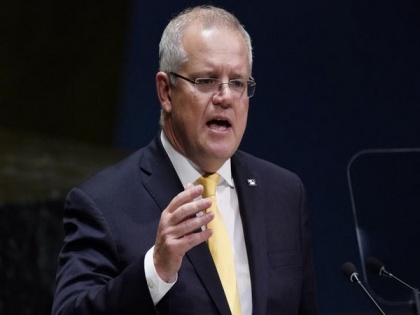Australia unveils 'Road Map for Respect' amid sexual harassment scandals
By ANI | Published: April 9, 2021 03:39 AM2021-04-09T03:39:34+5:302021-04-10T00:06:03+5:30
After two months of sexual harassment and assault scandals, including a claim of rape inside Parliament House, Australia's government agreed on Thursday to accept a series of recommendations that aim to prevent gender-based abuse and increase accountability for misbehavior in the workplace.

Australia unveils 'Road Map for Respect' amid sexual harassment scandals
After two months of sexual harassment and assault scandals, including a claim of rape inside Parliament House, Australia's government agreed on Thursday to accept a series of recommendations that aim to prevent gender-based abuse and increase accountability for misbehavior in the workplace.
Prime Minister Scott Morrison unveiled a "road map for respect" in response to the recommendations from the country's Sex Discrimination Commissioner that would improve workplace culture in the public and private sectors.
According to The New York Times, Morrison's announcement comprises his most comprehensive effort so far to tackle a problem that has been festering for years in Australian politics, with women mistreated, demeaned or sexually harassed, usually without recourse.
The outlet further reported that a federal review focusing on Parliament's workplace culture has also just begun and it may produce additional calls for reform as the demand for demonstrable change has continued to intensify.
Critics questioned whether the government's latest move would be enough. Noting that the initial report was published in March 2020, with much of its findings overlooked by Morrison's government until now, many women demanded more details and a clear timeline.
"It's going to take more than just words from this government to correct the impression that they don't care about these issues," said Louise Chappell, a political science professor at the University of New South Wales. "This is not going to go away."
Emma Husar, a former member of Parliament with the opposition Labor Party, said the government was still delivering only "the bare minimum."
"It takes a rape, a rape survivors rights advocate, a historical rape, 47, marches of 110,000 people to implement 55 recs of a report. I will not be grateful for the bare minimum shouldn't have taken this long. Slow clap for all those up the back who don't get it," she wrote in a tweet.
Morrison said his government accepted all 55 suggestions laid out in the report "in whole, in part or in principle," leading his critics to question which measures would be put in place at the federal level, passed on to states or given little more than lip service.
According to NYT, Many of the recommendations, including the creation of a national sexual harassment research agenda and "respectful relationship" training in schools, could take years to develop. And some of the changes announced on Thursday would simply bring Australia in line with other developed democracies -- such as the UK, Canada and the United States -- that have passed legislation in the past few years tightening workplace standards for lawmakers.
Chappell said Morrison still seemed to be struggling with how far to go with policy and how to talk about the issue. In his news conference on Thursday, he emphasized that to change the culture of disrespect in the workplace, all Australians needed to take responsibility, but not "in a way that sets Australians against each other."
She said the exemption for members of Parliament, for example -- a carve-out in the sex-discrimination law also given to religious orgzations -- seemed especially outdated. She welcomed the prime minister's promise to ensure that lawmakers and the legal profession would no longer get special treatment.
"With all the cases we have seen so far, they have been able to act with impunity because they are not accountable in the same way that people outside Parliament are," she said. "There's been pressure to change that for many years."
( With inputs from ANI )
Disclaimer: This post has been auto-published from an agency feed without any modifications to the text and has not been reviewed by an editor
Open in app